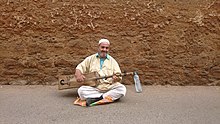
Back موسيقى كناوة Arabic ݣناوا ARY كناوه ARZ Гнауа (музыка) Bashkir Música gnawa Catalan Gnawa German Música gnawa Spanish Gnaoua French Gnawa ID Musica gnawa Italian
This article needs additional citations for verification. (September 2014) |
| Gnawa music | |
|---|---|
 A gnawa street performer wearing traditional gnawi clothing in Rabat's Qasbat al-Widaya | |
| Native name | ڭْناوة or كْناوة |
| Stylistic origins | Moroccan music |
| Gnawa | |
|---|---|
| Country | Morocco |
| Reference | 01170 |
| Region | Arab States |
| Inscription history | |
| Inscription | 2019 (14th session) |
| List | Representative |

Gnawa music (Ar. ڭْناوة or كْناوة) is a body of Moroccan religious songs and rhythms.[1][2] Emerging in the 16th and 17th centuries, Gnawa music developed through the cultural fusion of West Africans brought to Morocco, notably the Hausa, Fulani, and Bambara peoples, whose presence and heritage are reflected in the songs and rituals. Its well-preserved heritage combines ritual poetry with traditional music and dancing. The music is performed at lila, communal nights of celebration dedicated to prayer and healing guided by the Gnawa maalem, or master musician, and their group of musicians and dancers. Though many of the influences that formed this music can be traced to West African kingdoms, its traditional practice is concentrated in Morocco.[3] Gnawa music has spread to many other countries in Africa and Europe, such as France.[4]
The origins of Gnawa music are intricately associated with that of the famed royal "Black Guard" of Morocco.[5]
- ^ "Gnawa music: From slavery to prominence".
- ^ "The Transcendental Sound of Moroccan Gnawa Music". 30 May 2018.
- ^ El Hamel, Chouki (n.d.). [https://web.archive.org/web/20170729091123/http://www.afropop.org/9305/feature-gnawa-music-of-morocco/ Archived 2017-07-29 at the Wayback Machine "Gnawa Music of Morocco. afropop.org.
- ^ Meddeb, Abdelwahab (n.d.). Lila gnawa. franceculture.fr. (in French)
- ^ Pellizzi, Francesco; Pellizzi, Francesco (2012). Res: Anthropology and Aesthetics, 59/60: Spring/Autumn 2011. Harvard University Press. pp. 128–135. ISBN 978-0-87365-862-1.